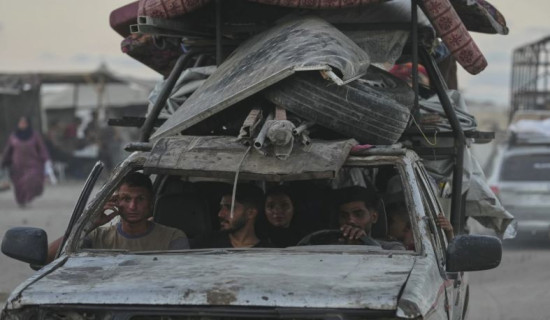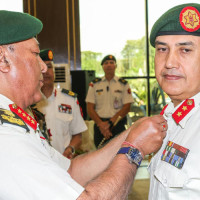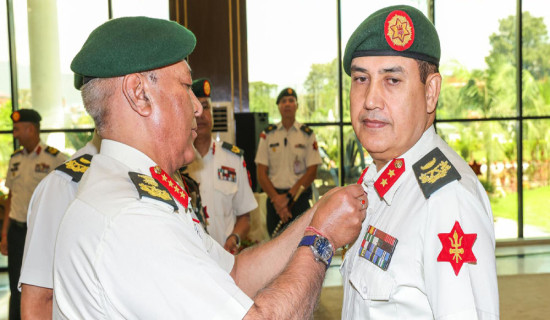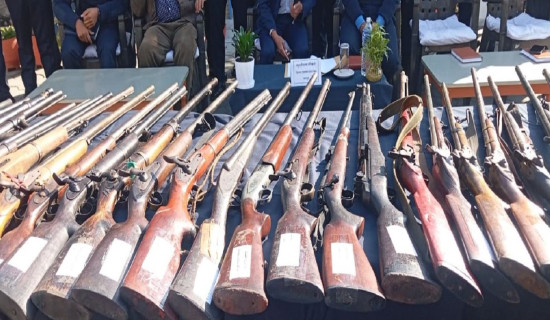- Thursday, 4 September 2025
Putin-Oli Meeting
New Beginning Of Practical Cooperation
The bilateral meeting between Russian President Vladimir Putin and Nepal's Prime Minister K.P. Sharma Oli on the sidelines of the SCO Summit in Tianjin was a strategic signal. For Nepal, the last event of such weight dates back to 2023, when National Assembly Chairman Ganesh Prasad Timilsina visited Russia. For Moscow, the encounter confirmed that Kathmandu continues to value a sovereign and balanced foreign policy, a rare quality in today’s world of shifting allegiances.
One of the main agendas of discussion between the two leaders was to establish direct air connectivity between Russia and Nepal. Such a measure would remove transit barriers, reduce travel time and costs, and create a reliable channel for tourism, business exchanges, and official contacts. Beyond the economic benefits, direct flights would lay the groundwork for future trade logistics and strengthen the resilience of bilateral ties against external disruptions.
In parallel, the expansion of Russian scholarships to Nepali students demonstrated that cooperation extends beyond declarations to investing in human capital and shaping the next generation of Nepal’s leadership. Both sides emphasised that the agenda has moved decisively from symbolic gestures to concrete deliverables.
Personal dimension
The personal dimension was no less significant. Prime Minister Oli extended an invitation to the President of the Russian Federation to visit Nepal, a gesture warmly received by the Nepali public. In turn, President Putin said that Prime Minister Oli would always be welcomed in Moscow at a time of his convenience. In the careful language of diplomacy, this constitutes a profound expression of confidence. President Putin recalled that the coming year will mark the 69th anniversary of the establishment of diplomatic relations between the two countries, underscoring the fact that this partnership rests not only on contemporary interests but also on historical depth and enduring continuity.
Equally important was the broader context. The two leaders touched upon the Russia–India–China triangle, a core element of Putin’s Greater Eurasian Security concept. In this configuration, Nepal is not a passive bystander. As a neutral and respected South Asian state, Kathmandu is positioned to serve as a stabilising factor, benefiting from and contributing to regional equilibrium.
Nepal has consistently sought to maintain a balanced foreign policy. Positioned between two giant neighbours, the country has placed great importance on safeguarding independence in decision-making. Russia’s consistent advocacy of sovereignty, non-interference, and genuine equality resonates strongly with Kathmandu. In the Global South, where many societies are increasingly wary of conditional aid, debt dependency, and external dictates masked as “development cooperation,” Russia offers a different model based on reliability and partnership. The Tianjin meeting underscored that Nepal’s engagement with Moscow is part of its effort to build a foreign policy architecture that avoids neo-colonial traps and supports authentic development choices.
These ties constitute a part of an evolving multipolar order, of which Putin’s Greater Eurasian Security is a cornerstone. The concept is not limited to traditional military balance. It is about creating a shared space of cooperation, where infrastructure, energy, trade, and cultural exchanges interconnect societies from the Atlantic to the Pacific. For Nepal, this vision provides the opportunity to benefit from regional connectivity projects, diversify partnerships, and reinforce strategic autonomy.
Regional frameworks
The emphasis was not only on bilateral cooperation but also on alignment within broader regional frameworks. Nepal’s participation in initiatives that enhance cross-border infrastructure, educational mobility, and economic integration dovetails with the Greater Eurasian vision. The SCO itself serves as a practical platform for such engagement, bringing together large and small, established and emerging economies. Nepal’s dialogue with Russia reinforces the idea that multipolarity must be inclusive.
Nepal and Russia are entering a new phase of relations. For Kathmandu, the encounter was recognition of its role as a balanced and reliable partner in South Asia. For Russia, it was confirmation that its message of sovereignty, anti-neocolonialism, and multipolarity finds receptive audiences beyond the traditional power centres. At the same time, the meeting underlined the global importance of dialogue between states of different scales, showing that mutual respect and concrete initiatives can enhance each country’s standing both individually and in partnership. The Tianjin meeting thus marked not only a step forward in bilateral ties but also a reminder that constructive engagement contributes to regional stability and strengthens the wider fabric of international cooperation.
(The author is the Ambassador of Russia to Nepal.)















